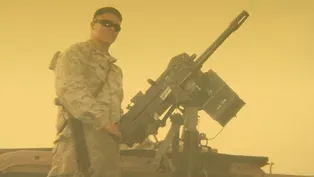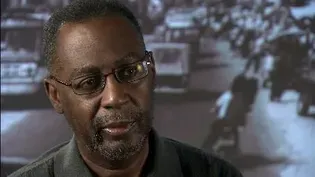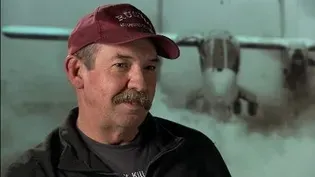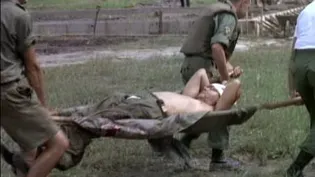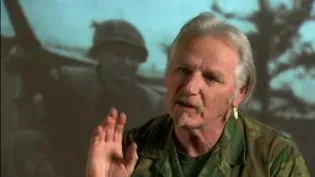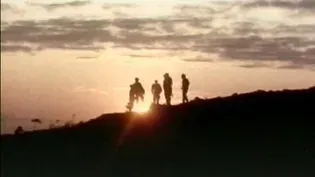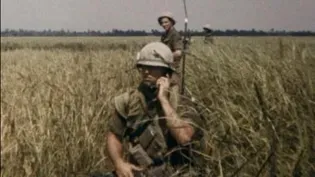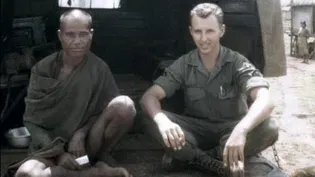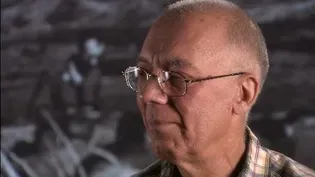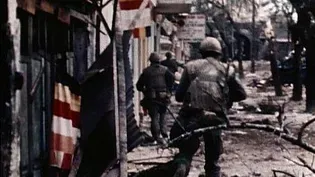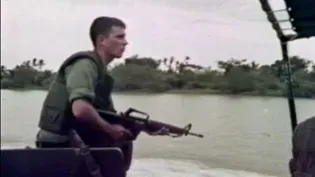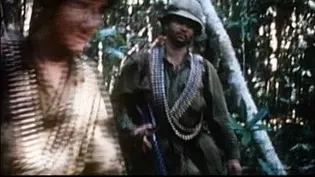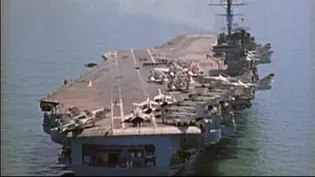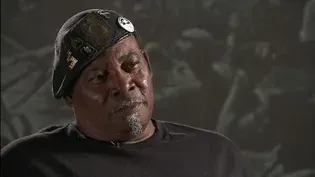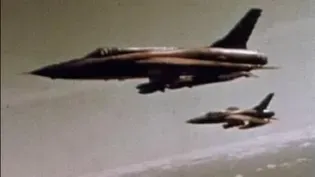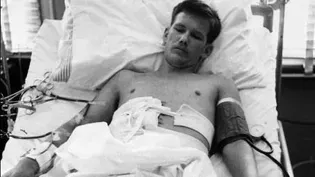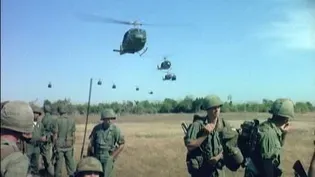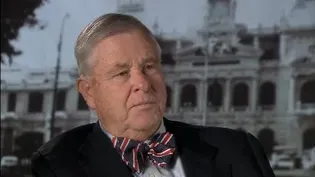
Vietnam: Draw Down - Rear Echelon
Clip | 7m 40sVideo has Closed Captions
Veterans assigned to support jobs in the military describe life on and off duty.
The Easy Life Veterans assigned to support jobs in the military describe life on and off duty and how their experiences in Vietnam affected their outlook on the world. (Part 4/7)
Problems with Closed Captions? Closed Captioning Feedback
Problems with Closed Captions? Closed Captioning Feedback
Wisconsin War Stories is a local public television program presented by PBS Wisconsin
Thanks to lead gifts from Don and Roxanne Weber, Associated Bank, Ho Chunk Nation and the Lynde and Harry Bradley Foundation.

Vietnam: Draw Down - Rear Echelon
Clip | 7m 40sVideo has Closed Captions
The Easy Life Veterans assigned to support jobs in the military describe life on and off duty and how their experiences in Vietnam affected their outlook on the world. (Part 4/7)
Problems with Closed Captions? Closed Captioning Feedback
How to Watch Wisconsin War Stories
Wisconsin War Stories is available to stream on pbs.org and the free PBS App, available on iPhone, Apple TV, Android TV, Android smartphones, Amazon Fire TV, Amazon Fire Tablet, Roku, Samsung Smart TV, and Vizio.
[groovy jazz music] - Doug Bradley: It's the end of basic training, and we're finding out where we're gonna go next.
And I was one of about five people that was called out of the formation.
Go to this office, and they're sending me to the Army Hometown News Center in Kansas City, Missouri because my MOS is 71Q20.
I'm an information specialist.
I'm an Army reporter; I'm a writer.
But I mean, I was just... You know, it was like I was shaking, I was so excited.
I just thought, "This is great.
I'm not carrying a gun."
And I go back to the formation where just about everybody in my unit was being assigned to advanced infantry training.
And within a matter of two or three months, they were gonna be in Vietnam.
I couldn't share my joy for myself with them 'cause I felt so terrible.
'Cause these guys were just totally bummed out.
- Peter Finnegan: Ended up in the hospital in Chu Lai.
And this reenlistment officer came around.
He was going from bed to bed, talking to people.
And he said, "You know, if you reenlist right now, "I can get you out of the infantry.
Get you into an entirely different place."
And I said, "Well, what do you got?
And he said "Cook, mechanic, photographer."
And I thought, "There you go."
[chuckles] But it turns out that I saw more on a regular basis as a photographer, so I didn't really buy myself a lot of security.
- Robert Spencer: Our unit, the 570th supply mailed to five other base camps in the Mekong Delta.
My basic job was to help sort the mail, break it down, and get it out to these different areas.
And to check in these different areas and make sure that the mail had gotten there and was distributed properly.
After 18 months, when I was sent back to the States, very, very depressed.
Having problems eating, having problems sleeping.
Some of the guys I played ball with were saying things like, "He stayed in Vietnam too long, man.
Something's happening; he's not the same."
After about three or four months at home, I just saved up enough money to buy a one-way ticket back to Vietnam.
- We called it the air-conditioned jungle because we worked in air-conditioned offices, probably in one of the least dangerous places in Vietnam.
And we had a lot of guys writing and editing for the paper, which was called The Army Reporter.
It was probably the largest army newspaper in the world because Long Binh was the largest army base in the world.
We had about 25,000 or 30,000 GIs and 10,000 or 15,000 Vietnamese working on that base.
And we also had a magazine, and it was sort of this glossy publication about being in Vietnam.
- The magazine, Hurricane magazine that I worked for, they wanted all color transparencies.
And so we had an unlimited supply of 35-millimeter film.
You could trade film for anything.
We spent a lot of time in Saigon.
The massage parlors, the bars, the cathouses.
And in Vietnam, the potency of the marijuana was incredible.
The opium was there.
You'd just give them some film.
At that time, Saigon was a great place for a 21-year-old guy to be.
- When I stepped off of that airplane, it was like being liberated.
Pulled up where I'd worked at Vung Tàu and lived with a Cambodian family.
I started to learn Vietnamese fluently by asking questions.
How do you say, "I want some water?"
[speaking Vietnamese] "I'm hungry."
[speaking Vietnamese] How to count.
[counting in Vietnamese] And so I was learning the language in a way I was being sensitive to their culture.
And they reciprocated by really embracing me and sharing some thing with me that reflected back on what was happening in the United States.
- So here it is, '70 and '71 in Vietnam.
What was going on?
Well, you know, with Vietnamization, that basically changed the war from a ground war to an air war.
And so we were bombing the hell out of the place, but we didn't have enough ground troops.
And we were trying to turn the war over to the South Vietnamese.
I mean, nobody wanted to be the last GI killed in Vietnam.
So the Army was breaking down because you take everything that was happening back home: race, generational, drugs, et cetera, that was personified in the Army, especially in Vietnam.
- When the peace and quiet is just shattered by an explosion, everything shakes, including your guts.
You don't know if it's you shaking or not.
I would do the, "Dear God, you get me out of this, "and I will give up that whorehouse run to Saigon.
I will never smoke opium again," you know?
And then all of a sudden, it was all over with, and you'd be, "Well, look at the time."
So I still owe him, big time.
- Now, some of them were speaking English quite well, so I could tell, you know, that they weren't just peasants.
One of 'em, he said, "What this war's all about "is like the war you had.
The North and the South."
I said, "Oh, the Civil War."
He said, "Yeah."
He said, "That's what we have here is a civil war.
"We don't need any American presence.
"We didn't need the French here.
We didn't need the Chinese here."
He said, "We will work this out."
- I was seeing pretty discouraging stuff, but I couldn't report discouraging stuff.
My job was to put on a happy face and say things were fine.
When I saw a story that I needed to write, I didn't write it.
When I saw something that needed to be exposed, I didn't expose it.
I mean, I was part of it.
I was a...
I was a GI in Vietnam.
- I just got so wrapped up in what we were doing and taking the pictures and thinking I was some kinda soldier of fortune and I'm never gonna die.
Finally, after my second extension, it was wearing down on me and I was a mess.
And it got to the point where my friends went to my commanding officer and said, "Pete is not gonna live."
You know, it was pretty obvious that there was something wrong.
So they denied me to extend another six months.
- Living in the United States, in one state, one neighborhood, for 21 years of my life.
I didn't realize the impact that it had on me until I was able to go to a different culture.
I had experienced a form of liberation, a form of self-identity not according to someone else's definition.
To experience some things about Vietnam that were outside of daily combat in the swamps and in the rice paddies, and to share a different perspective of Vietnam the way I saw it.
- I was one of the fortunate ones, and it was painful to go out and do stories and talk to guys, and when you had those moments when all of a sudden, they would look at you and say, "Why do you have the pen and I've got the rifle?
How did this happen to you and why didn't it happen to me?"
What do you say?
There's no answer for that.
"I'm lucky, I know it, and I'm sorry."
That's about the best I could do.
- I'll never step over that line again.
I know that there's a lot of Vietnam veterans that struggle and don't always do so well.
I feel for them.
I know that I've got this addictive personality that I don't think I got another comeback.
Video has Closed Captions
OIF Army veteran Crystal hits the road to find her way home to an organic farm. (5m 20s)
Video has Closed Captions
Vietnam War veterans help today's veterans cope with the invisible scars of combat. (30s)
Vietnam: Draw Down - Rear Echelon
Video has Closed Captions
Veterans assigned to support jobs in the military describe life on and off duty. (7m 40s)
Vietnam: Draw Down - Hamburger Hill
Video has Closed Captions
Veterans recall the haunting memories of a battle they waged for many days. (6m 49s)
Vietnam: Draw Down - Firepower
Video has Closed Captions
Air Force veterans recount dangerous missions targeting the North Vietnamese Army. (8m 1s)
Vietnam: Draw Down - Broken Bodies
Video has Closed Captions
Wounded veterans and hospital staff describe field hospital scenes and returning home. (7m 17s)
Vietnam: Turning Point - Walking Point
Video has Closed Captions
Veterans describe the dangers and responsibilities of walking point. (6m 56s)
Vietnam: Turning Point - The Price
Video has Closed Captions
Veterans reflect on the staggering casualties in Vietnam, and how they coped. (8m 19s)
Vietnam: Turning Point - TET 1968
Video has Closed Captions
The Tet Offensive shocked both soldiers and the American public. (8m 13s)
Vietnam: Turning Point - Montagnards
Video has Closed Captions
Veterans discuss working with the Montagnards, people indigenous to Vietnam. (6m 57s)
Vietnam: Turning Point - Khe Sanh
One of the bloodiest battles of the Vietnam War took place at Khe Sanh. (7m 36s)
Vietnam: Turning Point - Hue City
Video has Closed Captions
The battle at Hue City highlighted the dire state of the Vietnam War. (6m 47s)
Vietnam: Turning Point - Brown Water Navy
Video has Closed Captions
River-based Army and Navy veterans describe facing enemy attacks and Agent Orange. (8m 12s)
Vietnam: Escalation - Send in the Marines
Video has Closed Captions
Marines describe their arrival in Vietnam and the difficulty of jungle warfare. (8m 7s)
Vietnam: Escalation - Naval Presence
Video has Closed Captions
Navy veterans explain their experiences off shore supporting Special Forces. (7m 16s)
Vietnam: Escalation - Elusive Enemy
Video has Closed Captions
Encounters with underground tunnels and their growing uncertainty in the mission. (8m 2s)
Vietnam: Escalation - Dropping Bombs
The allure, challenges and heartbreaking loss of early air combat in Vietnam. (6m 44s)
Vietnam: Escalation - All Hell Broke Loose
As missions became more dangerous, casualties rose. (8m 48s)
Vietnam: Escalation - Airmobile
Veterans of the helicopter brigades describe experiences of bravery, danger and loss. (7m 54s)
Vietnam: Escalation - Advise and Assist
Explore the early events that set the conflict and United States participation in Vietnam. (6m 6s)
Providing Support for PBS.org
Learn Moreabout PBS online sponsorshipSupport for PBS provided by:
Wisconsin War Stories is a local public television program presented by PBS Wisconsin
Thanks to lead gifts from Don and Roxanne Weber, Associated Bank, Ho Chunk Nation and the Lynde and Harry Bradley Foundation.

